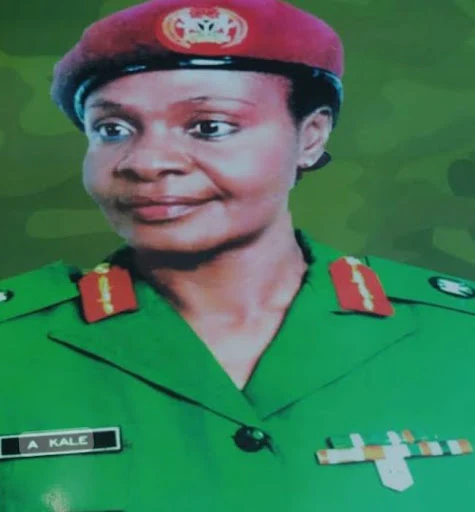The Nigerian Army has described the death of the first female officer of the Nigerian Army, late retired Major General Aderonke Kale as a great loss to the Army and the military community as a whole.
A statement by the Director Army Public Relations, Brigadier General Onyema Nwachukwu said the late Senior officer paved the way for others as she steadily rose through the ranks to attain the enviable height of Major General.
The Chief of Army Staff (COAS) Lieutenant General Taoreed Lagbaja, who expressied his commiserations on behalf of Officers, Soldiers and Civilian staff of the Nigerian Army to the family, relations and friends of the deceased Senior Officer described her as "the shining Veteran of the Nigerian Army who exuded unequalled commitment, diligence and unquestionable loyalty".
The Army Chief said "her legacies in the selfless service to Nigeria and humanity will remain indelible in the hearts of many as he prayed for the repose of her soul and the fortitude for the family to bear the irreplaceable loss".
The statement said "the Nigerian Army received with heavy heart, but in absolute submission to the divine will of Almighty God, the news of the passing to glory of the late Senior officer on Wednesday 8 November 2023".
General Aderonke Kale, renowned for reshaping the face of women and gender mainstreaming in the Nigerian military, was born into a family of professionals, her father was a pharmacist, and her mother a teacher.
She has her primary education in Lagos and Zaria, and had her post primary education in St. Anne’s School, Ibadan and Abeokuta Grammar School respectively.
She opted to study Medicine and successfully gained admission into the University College, which later became University of Ibadan. After her graduation as a medical doctor, she proceeded to the University of London to specialize in Psychiatry.
General Kale worked briefly in Britain and returned to Nigeria in the year 1971 to join the Nigerian Army in 1972. Her competence as a psychiatrist was recognized in 1973, when she qualified as a Consultant Psychiatrist and in 1982 she became Chief Consultant.
In the course of her service from 1980 to 1985 her management acumen came to bear in her career, when she became the Commanding Officer of the Military Hospital Ibadan. She thus had the distinction of being the first woman to command a military hospital in Nigeria.
In 1985 to 1987, she performed the same feat in the Military Hospital, Enugu, and from 1989 to 1990 in the Military Hospital, Benin. With such vital experience, she was elevated to the position of Deputy Commandant, Nigerian Army Medical Corps and School in 1991 till 1994.
In 1994, she became the first female officer to be promoted to the rank of Major General in the Nigerian Army and the West African subregion. She finally attained the peak of her career, when she became the Commandant of the Nigerian Army Medical Corps.
First time in the history of the Nigerian Army, that a female officer was entrusted with the crucial responsibility of health care for all Nigerian Army personnel and their families.



~2.png)

.jpg)

0 Comments